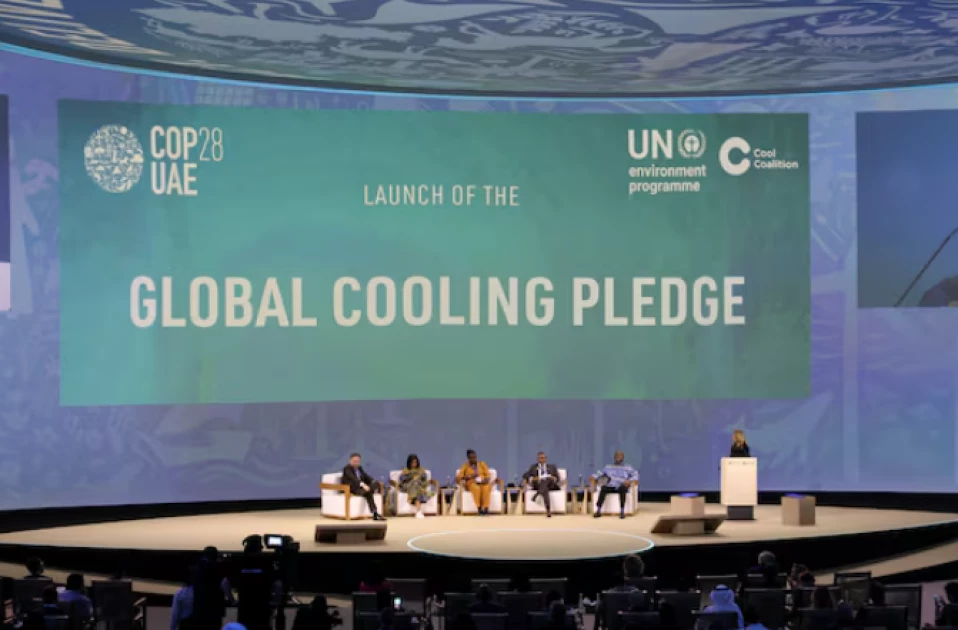Africa's bold demands at COP29: A call for ambitious climate finance

Republic of Rwanda's Minister of Environment Jeanne d'Arc Mujawamariya, CEO and Special Representative of the UN Secretary-General (UN SRSG) for Sustainable Energy for All Damilola Ogunbiyi, Danish Minister for Development Cooperation and Global Climate Policy Dan Joergensen and Maldives Minister of Climate Change, Environment and Energy, Thoriq Ibrahim attend the session of discussion on the Global Cooling Pledge aimed at reducing emissions and exploring sustainable cooling solutions, during the United Nations Climate Change Conference (COP28), in Dubai, United Arab Emirates, December 5, 2023. REUTERS/Thaier Al-Sudani/

Audio By Vocalize
As the world prepares for the 29th session of
the Conference of the Parties (COP29) to the UNFCCC, Africa is positioning
itself as a critical player in the global climate finance negotiations.
With the upcoming summit in Dubai set to
focus on the negotiation of a New Collective Quantified Goal (NCQG), African
nations are urging for a shift towards more ambitious and equitable climate
finance commitments.
The NCQG aims to mobilize significant
financial resources to support climate action in developing countries,
particularly in implementing their Nationally Determined Contributions (NDCs)
and National Adaptation Plans (NAPs).
Africa, a continent bearing a
disproportionate share of climate change’s adverse impacts, is calling for a
reimagined approach to climate finance—one that goes beyond the previous $100
billion commitment, which fell short of meeting the continent's financial
needs.
African leaders are advocating for a bold
NCQG target that will enable developing nations to fulfill their climate
obligations and adapt to climate change’s escalating effects.
Emphasizing the need for climate finance to
be provided through grants rather than loans, African nations seek to avoid
exacerbating the debt burdens of already struggling economies. The call is for
climate finance that is both substantial and well-targeted—addressing
adaptation, mitigation, and loss and damage without deepening existing economic
vulnerabilities.
Africa demands that the NCQG be informed by
scientific evidence, focusing on equity and fairness, with clear distinctions
between grants and loans. With African economies reportedly losing 5-9% of GDP
annually due to climate impacts, there is an urgent need for increased
financial flows to build resilience and adaptive capacity.
The continent has set a clear financial
target, seeking $1.3 trillion per year to meet its adaptation and mitigation
goals. While ambitious, this figure reflects the scale of the climate challenge
and the insufficiency of current commitments from developed nations.
Iskander Erzini Vernoit, Director of the IMAL
Initiative for Climate and Development, highlighted the urgency of the moment stating “We cannot continue in an
unbalanced system.”
“This is the time to draw a line in the sand and demand serious, new, and
additional finance. Otherwise, it risks becoming a performative charade,” added Vernoit.
Julius Mbatia, a Climate Finance Expert,
emphasized the need for a tailored financial approach noting that climate finance must be
separate from development finance.
“It requires specific principles, including being additional and new, to
address the extra burden climate change imposes on developing countries. Strong
media and communications engagement is essential to highlight these needs and
push for fairness and equity,” he highlighted.
COP29 is expected to be a defining moment for
global climate action, with the NCQG negotiations poised to set the course for
future climate finance. Africa’s.


Leave a Comment